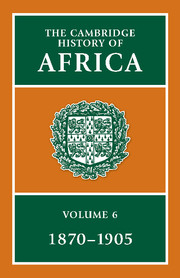Book contents
- Frontmatter
- Introduction
- 1 Africa on the Eve of Partition
- 2 The European Partition of Africa: Origins and Dynamics
- 3 North Africa
- 4 Western Africa, 1870–1886
- 5 Western Africa, 1886–1905
- 6 Western Equatorial Africa
- A French Congo and Gabon 1886–1905
- B King Leopold's Congo, 1886–1908
- 7 Southern Africa, 1867–1886
- 8 Southern and Central Africa, 1886–1910
- 9 Portuguese Colonies and Madagascar
- 10 East Africa 1870–1905
- 11 The Nile Basin and the Eastern Horn, 1870–1908
- 12 The European Scramble and Conquest in African History
- Bibliographical Essays
- Bibliography
- Index
- Map 9 West Africa, c. 1870">
- Map 10 West Africa, c. 1905
- Map 13 The Congo Independent State
- Map 26 Ethiopia, the Nile Valley and the Horn in the era of Menelik II
- References
B - King Leopold's Congo, 1886–1908
from 6 - Western Equatorial Africa
Published online by Cambridge University Press: 28 March 2008
- Frontmatter
- Introduction
- 1 Africa on the Eve of Partition
- 2 The European Partition of Africa: Origins and Dynamics
- 3 North Africa
- 4 Western Africa, 1870–1886
- 5 Western Africa, 1886–1905
- 6 Western Equatorial Africa
- A French Congo and Gabon 1886–1905
- B King Leopold's Congo, 1886–1908
- 7 Southern Africa, 1867–1886
- 8 Southern and Central Africa, 1886–1910
- 9 Portuguese Colonies and Madagascar
- 10 East Africa 1870–1905
- 11 The Nile Basin and the Eastern Horn, 1870–1908
- 12 The European Scramble and Conquest in African History
- Bibliographical Essays
- Bibliography
- Index
- Map 9 West Africa, c. 1870">
- Map 10 West Africa, c. 1905
- Map 13 The Congo Independent State
- Map 26 Ethiopia, the Nile Valley and the Horn in the era of Menelik II
- References
Summary
IN EUROPE
The fact that the title of this chapter bears the name of a European monarch is fully significant. The Congo was a political entity brought into being on African soil completely by the will of one man, and that man – who never visited his dominion – governed it from his residence in Europe in a completely autocratic way.
The Congo Independent State (Etat indépendant du Congo), under the personal government of King Leopold, lasted from 1885 to 1908. In 1908, it was annexed by Belgium and became a Belgian colony, the ‘Belgian Congo’. Well before 1908, however, the term ‘Belgian Congo’ was very often used by foreign writers. This can readily be understood when one considers the way in which the Independent State appeared to them. The sovereign of the state, they thought, was the King of the Belgians, who was, as everyone knew, ardently devoted to Belgian interests. The central services of the state were located in Brussels, and all its officials were Belgian. As for the Congo itself – in the administration, in the army, and in the courts - the essential role was played by Belgians, particularly by officers of the Belgian army assigned to African service. Even the religious missions – at any rate those of the Catholics, which were most favoured by the state – almost all had a markedly Belgian character. How, in such circumstances, could contemporaries have failed to come to speak naturally of a ‘Belgian Congo’? Nevertheless, the usage was quite improper.
Keywords
- Type
- Chapter
- Information
- The Cambridge History of Africa , pp. 315 - 358Publisher: Cambridge University PressPrint publication year: 1985
References
- 26
- Cited by

